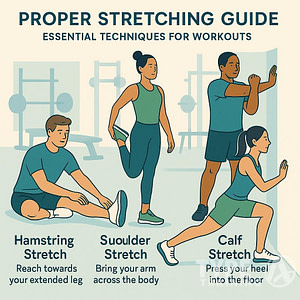In today’s digital age, screen time is an integral part of daily life, influencing both sleep and mental health.
Excessive screen use can disrupt sleep patterns and contribute to mental health challenges.
Whether it’s using a phone before bed or spending hours on social media, these habits can have a significant impact on how well you sleep and how you feel.
Popular posts:
Understanding the effects of screen exposure is crucial for everyone, from children to adults.
For instance, studies suggest that using digital devices close to bedtime can interfere with your ability to fall asleep and stay asleep.
Additionally, there’s an increasing concern about the relationship between prolonged screen time and mental health issues, such as anxiety and depression.
Navigating a world full of screens can be challenging, but adopting healthy screen habits is possible.
By exploring strategies for balanced use, you can minimize negative impacts on your well-being and make screen time a positive part of your life.
Key Takeaways
- Excessive screen time can harm sleep and mental health.
- Balanced screen use is essential for better well-being.
- Adopting healthy habits can enhance your life quality.
Defining Screen Time and Its Prevalence
Screen time refers to the amount of time you spend using devices with screens such as smartphones, computers, and televisions.
As digital media has become an integral part of daily life, understanding the different forms and trends of screen usage is essential.
Forms of Digital Media
Digital media includes various forms such as television, video games, and social media. Each platform influences how screen time is experienced in your daily life.
Television remains a popular source of entertainment, providing a vast array of channels and streaming services.
Video games offer interactive experiences that can engage you for hours, attracting both young and older audiences. They range from console games to mobile device applications.
Social media platforms like Facebook, Instagram, and Twitter allow you to connect with friends and share content conveniently.
Access to these platforms usually occurs through electronic devices like smartphones, tablets, and laptops. This broad spectrum of digital media contributes to the variety and richness of screen time experiences.
Increasing Trends in Screen Usage
In recent years, screen time has seen a significant increase among various age groups.
The rise in smartphone usage has led to more hours spent in front of screens, often resulting in smartphone addiction.
You may find yourself checking your phone frequently for social media updates, news, or messages.
Electronic devices are now essential for work, communication, and entertainment, contributing to this trend.
The global pandemic also played a role in boosting screen usage, as activities like video conferencing became a part of daily routines.
As digital media continues to grow, so does the prevalence of screen usage, making it important to be aware of both the benefits and potential drawbacks of increased screen time.
Physiological Impact of Screen Exposure
Screen exposure can affect your body in several ways, notably sleep patterns and visual health. Understanding these effects can help you make informed choices about screen use.
Effects on Sleep Quality and Duration
Screen time, especially before bed, can disrupt your sleep patterns.
Digital screens emit blue light, which can hinder the production of melatonin, a hormone that promotes sleep.
Reduced melatonin levels may lead to poor sleep quality and shorter sleep duration.
Using devices late at night often results in delayed sleep cycles, making you feel tired the next day.
Establishing screen-free periods before bedtime can minimize these disruptions.
Behavioral strategies may greatly improve your sleep health despite daily screen exposure.
Visual Health and Physical Discomfort
Screen time can take a toll on your visual health.
Prolonged exposure often leads to eye strain and can exacerbate other symptoms like headaches and dry eyes.
You might experience discomfort when focusing on screens for long periods without breaks. This can also affect vision in the long run.
Digital eye strain, commonly known as computer vision syndrome, arises from extended digital device usage.
Taking regular breaks and practicing good posture can help reduce eye strain and discomfort.
Adjusting screen brightness and maintaining a proper viewing distance also play roles in lessening physical discomfort during screen use.
Screen Time and Mental Health in Different Age Groups
Screen time impacts mental health across all ages, though the effects can vary. For children and adolescents, excessive use often links to issues like anxiety and depression.
In adults, including healthcare workers, screen time can contribute to stress and emotional instability, especially during periods like the COVID-19 pandemic.
Children and Adolescents
In children and adolescents, screen time is often associated with negative mental health outcomes.
High levels of screen exposure can lead to symptoms of anxiety and depression. Young people frequently use devices like smartphones and tablets, which may impact their emotional well-being.
Research has shown a connection between adolescent screen time and lower psychological well-being, with issues such as stress becoming common.
Emotional stability can be affected as screen time increases, making it vital for parents and educators to monitor screen usage.
Balancing educational and recreational screen time is crucial to support youth mental health.
Impact on Adults and Healthcare Workers
For adults, especially during times like the COVID-19 pandemic, the effects can be pronounced.
Screen time can be linked to stress and depressive symptoms. Many adults found themselves working remotely, leading to increased screen exposure.
Healthcare workers, in particular, faced heightened stress due to constant updates via screens, affecting their mental health.
Excessive screen time in adults often correlates with anxiety and depression, impacting overall emotional well-being.
It’s important for adults to set boundaries around their screen use to maintain balance. Healthcare workers may need targeted support to handle these pressures effectively.
글에서 refers to: “In the text,” a word typically used in Korean texts, and the translation provides a clearer understanding in English.
Social and Behavioral Outcomes of Digital Interaction
Digital interaction affects various areas of life, from personal relationships to cognitive development.
While social media can foster connections, it might also lead to mental stress or poor academic performance. Understanding these impacts can help you manage screen time effectively.
Social Media Use and Relationships
Social media has the power to connect you with people worldwide, yet it can also strain your relationships.
Constant engagement might replace valuable face-to-face interaction. You might notice that strong online connections sometimes lack the depth of those formed in person.
This can impact emotional bonds and overall well-being.
Excessive social media use may cause stress and anxiety, known as the fear of missing out (FOMO).
You may feel pressured to keep up with notifications and updates.
It’s essential to balance online interactions with offline ones to maintain strong, meaningful relationships.
Cognitive and Academic Effects
Cognitive performance can be affected by too much screen time.
Paying attention to screens for long periods may reduce your ability to focus on tasks that need concentration.
This can impact tasks like reading or even listening during classes. Online information bombardment may make it difficult to ignore distractions.
In terms of academic performance, excessive screen time may lead to reduced study time or careless errors in schoolwork.
Quick access to digital resources might make it seem like multitasking is effective, but splitting attention can often reduce understanding and productivity.
Take breaks from screens to support better academic outcomes.
Online Behavior and Self-Control
Online behavior can reflect your self-control levels.
You may find yourself spending more time online than intended due to the addictive nature of certain digital platforms.
This can lead to internet addiction, impacting productivity and personal goals.
Practicing self-control by setting usage limits and prioritizing important tasks can be beneficial.
Notifications should be managed to reduce unnecessary distractions, maintaining focus on essential activities.
Balancing digital use with offline activities can strengthen your self-discipline and enhance your online experience without negatively impacting your routine.
Strategies for Healthy Screen Engagement
Balancing screen time with positive sleep and mental health outcomes requires targeted strategies.
You can reduce negative effects by adopting interventions and treatment approaches, along with specific behavioral recommendations.
Interventions and Treatment Approaches
Various interventions can help you manage screen time to benefit sleep and mental health.
Research shows that limiting prebedtime screen use significantly improves sleep quality.
Interventions focus on reducing exposure to blue light and stimulating prebedtime content.
Behavioral modifications like setting consistent screen-free periods before bed are important.
Treatments for excessive screen time include cognitive-behavioral therapy (CBT) and other psychological approaches.
These help you identify and modify habits that lead to problematic screen use behaviors.
Studies highlight the need for comprehensive, personalized intervention plans for optimal results.
Behavioral Recommendations
Incorporating specific behavioral strategies into your daily routine can enhance your overall well-being.
The consensus among health experts is that you should follow the National Sleep Foundation’s guidelines. They advocate for screen-free time at least 30 minutes before bed, as this reduces the impact of blue light on your sleep.
Creating a structured schedule helps you manage screen time effectively.
Establishing tech-free zones in the home can also encourage healthier habits.
Practicing digital detox periods during weekends or vacations can further contribute to better sleep and mental health. Aim for interactive and engaging activities as alternatives to screen use.












